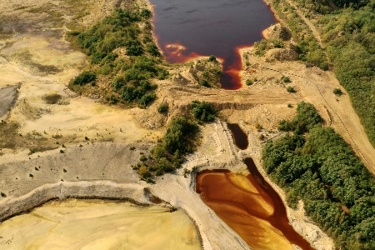2024: Bold, Technological Action On Water Efficiency Urgently Needed

Water efficiency is becoming more important by the day. Efficiency is essential to sustainability and survival in a scenario characterized by water scarcity, water pollution, sustainable management and climate change.
It is precisely climate change, which manifests itself through increasingly frequent extreme events around the world. In this sense, data from the “Global Drought Snapshot”, a report drawn up by the United Nations Convention to Combat Desertification (UNCCD), show that drought is "an unprecedented emergency", affecting all regions.
Technology companies in the sector are well aware of this and have been striving for years to implement solutions to increase water efficiency and thus meet the current and future needs of people and the environment. In this regard, Géraud de Saint-Exupéry, Europe Comercial Leader at Xylem, recently underscored the “critical need to integrate water efficiency, smart water management technologies, and solid conservation policies – all pivotal in steering Europe towards a sustainable and resilient water future”.
In 2024, the water sector is therefore facing unprecedented pressure to take bold, revolutionary action. Read on for a closer look at five key issues that are defining water efficiency in this pivotal year.
1. Smart technology: the digital water revolution
In the current context, efficient water management is a global priority. Technology plays a crucial role in this challenging scenario, delivering innovative solutions to improve water efficiency in a number of areas.
One of the main developments in water technology is the implementation of real-time monitoring and control systems. Sensors, meters and telemetry systems collect accurate data about the control, quality and availability of water, assisting decision-making and optimizing operational processes.
In this regard, Chema Nebot Vice President EMEA-APAC-BRASIL at Idrica, highlights “utilities also have a key role to play in delivering water efficiency. The use of technology is a driving force in water management, reducing the water, energy and carbon footprint. The progressive deployment of smart asset management, digital twins, smart metering using the Internet of Things (IoT), and geographic information systems (GIS) to pinpoint the best location for pipes and the connections between them, means utilities can manage the water cycle much more efficiently”. The utility Global Omnium, whose digital transformation process is a benchmark case study in the sector, is a prime example of this.
2. Sustainable agriculture: repurposing water use in food production
Agriculture is shifting towards more sustainable practices to optimize water use in 2024. As the FAO pointed out at the 2023 Rome Conference, "irrigation water use plays a key role in increasing crop yields and productivity", which is why one of the organization's objectives is precisely to "increase and sustain water efficiency of both rainfed and irrigated agroecosystems".
This is why smart irrigation technology, precision agriculture and the cultivation of crops that are more resistant to water stress are essential strategies. In addition, soil management practices that improve water retention, and reduce runoff and erosion are being promoted. According to Begoña Tarrazona, an irrigation specialist at Idrica, "agriculture is a key sector in which water efficiency is vital as it accounts for 70% of the water consumed worldwide. This means that it is fundamental to combine local knowledge, technology, and research and development to ensure that agriculture is sustainable".
3. Reuse and recycling: closing the water cycle
Water reuse and recycling are vital components in the quest for superior efficiency in the water sector. It is essential to embrace strategies that optimize the use of this limited resource, given the burgeoning pressure on water resources caused by population growth, urbanization, and climate change.
Giorgio Sabbatini, Vice President Europe South & West and AWS at Xylem, points out that “It is important to differentiate between the two concepts. Water reuse involves the treatment and use of treated wastewater for a range of purposes, such as agricultural irrigation, groundwater replenishment, industrial supply, and urban irrigation”. In this regard, the use of systems such as reverse osmosis and advanced disinfection ensure safe water supply for non-drinking uses. Conversely, water recycling focuses on the recovery and reuse of water within the same process or system.
4. Citizen awareness: the key role of education and participation
Citizen awareness is at the heart of water efficiency. Education about responsible water use and active community participation are key to achieving sustainable management. Community initiatives, educational programs and awareness campaigns are springing up to foster respect for water as a limited resource.
5. Cooperation and strategic partnerships
Climate change is affecting the availability and distribution of water. In 2024, the water sector is pursuing climate resilience and adaptation strategies. This includes integrated water resource management, building more robust infrastructure, and diversifying water sources to ensure supply even in extreme weather conditions.
However, in an interconnected world, cooperation is also paramount. Water utilities are forging strategic partnerships with government organizations, NGOs, academic institutions and other businesses to tackle water challenges together. As noted by the United Nations in the World Water Development Report 2023, entitled “Partnerships and cooperation for water”, “building partnerships and enhancing cooperation across all dimensions of sustainable development are essential to accelerating progress towards all the targets of SDG 6 and realizing the human rights to water and sanitation”.
Therefore, these partnerships foster the sharing of knowledge and resources, as well as expanding the impact of water efficiency initiatives through a coordinated, multi-faceted approach.
About Idrica
Idrica is a leading international water technology company specializing in digital solutions. Founded by Fomento Urbano de Castellón, S.A. and headquartered in Valencia (Spain), it brings more than a decade of experience in the digitalization of the water sector. Its team of over 200 experts is transforming the management of drinking water, wastewater and irrigation around the world.
Source: Idrica
